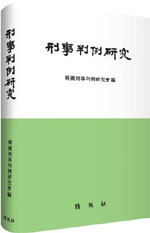전직한 종업원의 영업비밀 사용과 업무상 배임죄
Use of Company’s Trade Secrets by a Former Employee and Occupational Misappropriation
- 한국형사판례연구회
- 형사판례연구
- 형사판례연구 제19권
-
2011.06266 - 297 (32 pages)
- 14

The Supreme Court precedent is related to this litigation regarding several important issues. The first issue is on the exact definition of trade secrets acquisition and their use under the Article 18 of the Prevention of Unfair Competition Act. Other pertinent issues are, once an employee appropriates trade secrets or main assets for a rival company, in what case it would be considered as committing occupational breach of trust and what would constitute as onset of the crime. The Supreme Court held that accessing trade secrets within close time frame of the pertaining business activity with intentions to use the confidential business information regarding that activity would be sufficiently deemed as start of the crime. Additionally, in the case of electronic files such as a tub cards holder, the Supreme Court decided that running of the electronic files would be recognized as onset of the crime. These decisions by the Supreme Court are not particularly problematic. On the other hand, since it is more difficult to determine whether a retired or former employee has committed such occupational breach of trust, the issue calls for further discussion. In order to charge a former employee with professional misappropriation, the employee must be “a person who deals with affairs of others.” In such case, if the former employee has signed a contract with the employer to keep trade secret for reasonable time, there are discernable grounds for putting burden on the employee to maintain confidentiality. However, any confidentiality agreement that is either permanent or lacking specific term for time limit can be excessively infringing on the freedom of former employees to choose their occupation. As a result, provided that the former employee does not have a confidentiality agreement, he should not be punished for occupational misappropriation in order to respect constitutional freedom of career choice and to maintain a balanced interpretation. Furthermore, it is likely that the court will interpret an action requiring an employee to keep business information confidential for unreasonably long time many years after expiration of his employment contract as excessively infringing upon fundamental rights of the employee, such as the freedom of career choice. In addition, other related precedents show similar attitudes even when the employee acquires trade secrets by means of his memories. Thus, I strongly believe that the court should be more cautious in this matter in order to guard basic human rights from ambiguous interpretations.
Ⅰ. 문제제기
Ⅱ. 부정경쟁방지법상의 영업비밀보호
Ⅲ. 영업비밀 침해죄와 업무상 배임죄
Ⅳ. 결론
(0)
(0)